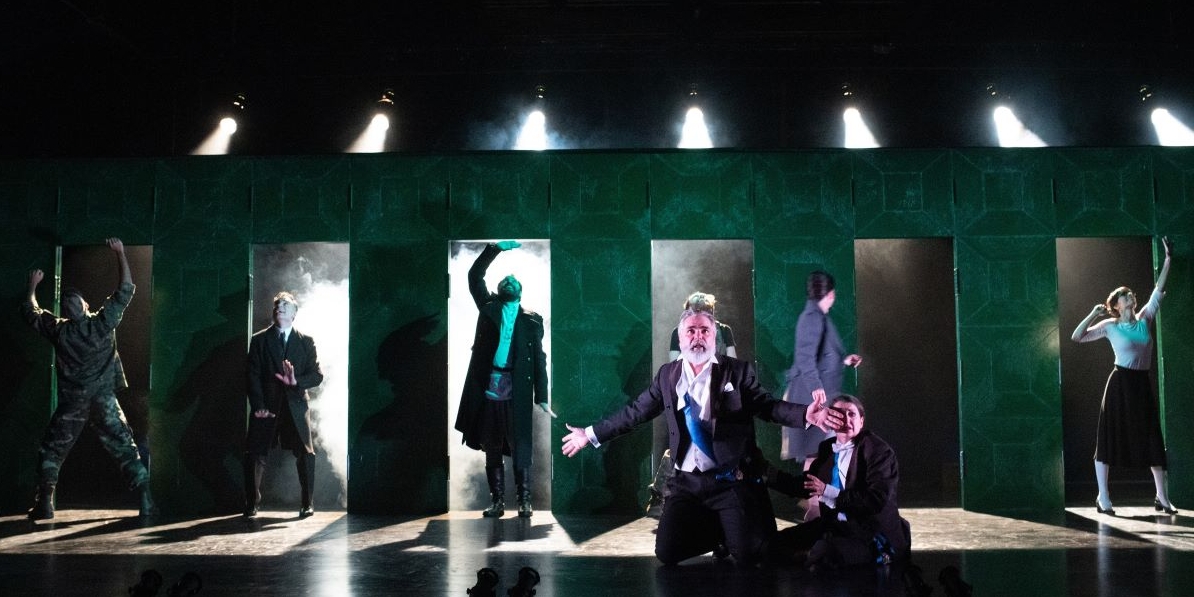Calderón’s ‘Life is a Dream’ (La Vida es Sueño) dates from the second phase of the Golden Age of Spanish drama and is one its classic texts. Many theatre companies would be intimidated by its conventions and reputation, but not Cheek by Jowl, to whom reinvention of literary landmarks is second nature. This production is a text-book example of the merits of their approach, combining fidelity to and respect for the text (delivered in Spanish by Spanish actors) while reimagining its staging in original ways that showcase inventive design, movement, lighting, and use of telling music.
While there are some parallels with Shakespearean themes and priorities, notably around the travails of kingship and father-son relationships, the play has a very different feel and trajectory. Here plot and structure matter less than the exploration of religious and philosophical questions of identity, fate, free will, and above all pondering the difference, if there is one, between the world of everyday rational realities and the frenetic, fantasy dreamworlds. In recapturing the urgency of this lost world it is a real help to hear the resonant, sonorous formality of the original text delivered as intended, alongside a literate and demanding translation in the surtitles (the latter a great job by Juan Ollero!).
The action of the play concerns the heir to the Polish throne, Segismundo, who has grown up in prison because of a prophecy that suggests he will run amok if ever allowed to rule. His father, King Basilio, relents, and after his jailor has drugged the prince, he is installed in a position of power where he predictably does run wild. A subplot concerns a woman, Rosaura, bent on revenge, who has come to the court in male disguise, and she and her servant become enmeshed in the central royal conflict as well as in the machinations of the king’s nephew and niece, both of whom have designs on the throne. A popular rebellion frees the prince and installs him as ruler. We are continually invited to reflect, from the prince’s perspective, on where his reality lies – in prison, at court, or in dynamic rebellion – which of these conditions or states or mind has permanence or meaning, if any of them do..? Given the brevity and shifting nature of life what meaning can we find or rely on?
Cheek by Jowl ensure that the seriousness of these themes is given full weight, and the most important speeches are delivered with great clarity, precision and care by all the actors. But the show is also full of visual surprise and impish fun that ensures the flow of the action is always provided with a visual correlate. Nick Ormerod has come up with a delightfully simple but effective set – a wall studded with many doors, through which the cast burst in and out in almost farcical fashion. A sense of palace whispers, corridor conspiracy and revolutionary upheaval is assembled that frames the text with impressive specificity. Contemporary dress, whether formal court attire or battle fatigues, brings the action into the present day, and a subtle lighting palette underscores the tone of the work at key points.
In the very demanding lead role of the prince Alfredo Noval dominates every scene – he draws us into his lonely despair as a chained prisoner, takes his confusion and panic out into the auditorium as he is suddenly released on the world, and then schools us all on the journey he has travelled as he attempts to put the world to rights in the final scene. This is a true bravura performance. But this is still an ensemble show with no weak links in a crack cast and everyone given room to take their solo moments to good effect.
Particularly notable are Ernesto Arias as the much put-upon king, who you sense, like Lear, is ‘more sinned-against, than sinning’; David Luque as the loyal courtier, Clotaldo, who enacts his dilemmas of loyalty and allegiance with memorable feeling; Rebeca Matellán, who shifts many shapes very skilfully as Rosaura; Goizalde Núñez, as the wily Sancho Panza-like servant, Clarín, who generates a lot of the comic brio; and Manual Moya and Irene Seranno, as the Machiavellian relatives, who explore the full range of political choices.
This production has toured Spain already and now proceeds to other European destinations. It deserves the attention of anyone interested in seeing how a play covered with many layers of classic varnish can be stripped down and reworked in a fashion that still preserves its core messages and questions in a way that will continue to appeal to new generations of theatregoers. Don’t miss it!

